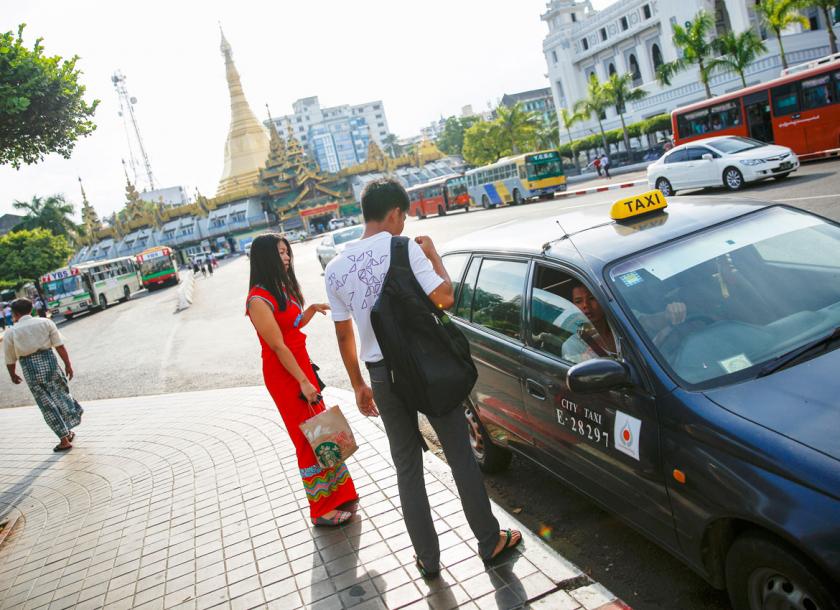Myanmar: Concerns from multiple parties emerge following Grab, Uber merger
Concerns are mounting from multiple parties after Grab, the taxi ride hailing company, officially announced the acquisition of rival Uber’s Southeast Asia operations on Monday.
‘‘We have reached an agreement to combine our business in Southeast Asia with Grab. In exchange, Uber will take up a 27.5 percent stake in the combined company. After investing $700 million in the region, we will hold a stake worth several billion dollars,” said Uber CEO Dara Khosrowshahi, who will now join Grab’s board.
The deal comes just a year after Grab and Uber both introduced their mobile ride hailing services in Myanmar. Uber will now move its services over to the Grab platform by April 8, after which the Uber driver app will continue to be operational in Southeast Asia for two more weeks. All taxi bookings should be made from the Grab app from then on.
The combined business has many drivers wondering how the current level of incentives will change after the merger. Both companies have different reward systems to encourage drivers to accept more bookings. With Grab likely to take on more drivers now, some are concerned that incentives may be reduced going forward.
“We can get more bonus incentives for Uber, whereas it is difficult to earn bonuses from Grab unless we drive all day and all night, said U Win Myint, a driver for both Uber and Grab.
Passengers, too, are concerned about service and fares going forward. “I prefer Uber because its cars are always clean and air-conditioned. Grab drivers also have poor relationships with their passengers. But sometimes, Uber takes up to ten minutes to arrive compared to Grab. I am concerned that the merger will result in less options for riders in terms of convenience, fares and services,” said Ma Yu Thandar from North Dagon Township.
Better benefits
When contacted by The Myanmar Times, a spokesperson for Grab said the company is working on ensuring both drivers and passengers are better off as a result of the deal.
“Drivers can look forward to enjoying the benefits of a larger Grab network with a larger pool of passengers. For example, [they can expect] more bookings, better matching of passengers and drivers and greater earnings potential,” the spokesperson said.
Passengers can also expect better service with more drivers and transport options. “Grab’s approach to pricing has always been guided by market demand and supply to ensure the fairest fare for both our drivers and passengers. We believe combining Uber’s and Grab’s operations will improve efficiencies and synergies in Grab’s’ network and potentially lower trip fares,” the spokesperson said.
Grab also encouraged passengers to leave complaints about poor service on its app, saying the company relies on the feedback to better understand their needs, make improvements and take action on errant drivers if needed.
 Grab’s takeover of Uber’s Southeast Asia operations is raising concerns in Yangon. Aung Htay Hlaing/The Myanmar Times
Grab’s takeover of Uber’s Southeast Asia operations is raising concerns in Yangon. Aung Htay Hlaing/The Myanmar Times
Monopoly?
Concerns of Grab monopolising the Yangon taxi market are also mounting among Grab’s rivals, Hello Cabs and Oway Ride. “The international taxi operators have invested big money here and local operators cannot compete with them. We are still struggling to grow our market share and we have less capital to invest in improving our app and operations,” said Ko Aye Zaw Maung Maung, head of driver operations at Oway Ride.
In fact, calls for the authorities to regulate the taxi market have already been raised in Parliament. “The taxi operators are undercutting each other with low promotional rates. This will be the downfall of the local operators, which are much smaller than the international operators. The government needs to set rules ensuring equality and service quality,”
U Nay Bone Latt, MP from Thingankyun township, said last December.
In response to the MP’s queries, Daw Nilar Kyaw, Minister of Electricity, Industry, Transport and Communication, had said that plans were in motion to cooperate with the Road Transport Administration Department and Yangon Region Transport Authority to set rules bringing all operators on equal ground.
In the past, the government had also promised to reform the taxi industry after upgrading the public transportation system. There are currently about 70,000 taxis operating in Yangon, but there is no taxi regulatory authority or association.
Metered fares
In the meantime, new businesses are entering the ride-hailing market. Kilo Taxi Group, a local operator, said it is planning to introduce drivers and passengers to a metered fare app, which will start taxi fares off at a minimum charge of K1,300 and add K300 for every kilometer traveled to the fare. The app is scheduled to launch on April 1.
“These days, many people are booking taxis using mobile apps. We want to help drivers who have not registered with a mobile app company. So, we came up with the idea of creating a metered fare app for these drivers. Passengers can see the fare on the drivers’ mobile phones while riding on an ordinary taxi, said U Ko Ko Lin, founder of Kilo Taxi Group.
“Riders can trust our app and we will guarantee safety and good service. We can’t rely too much on the government and should innovate for ourselves,” he added.
Source: https://www.mmtimes.com/news/concerns-multiple-parties-emerge-following-grab-uber-merger.html


 English
English




